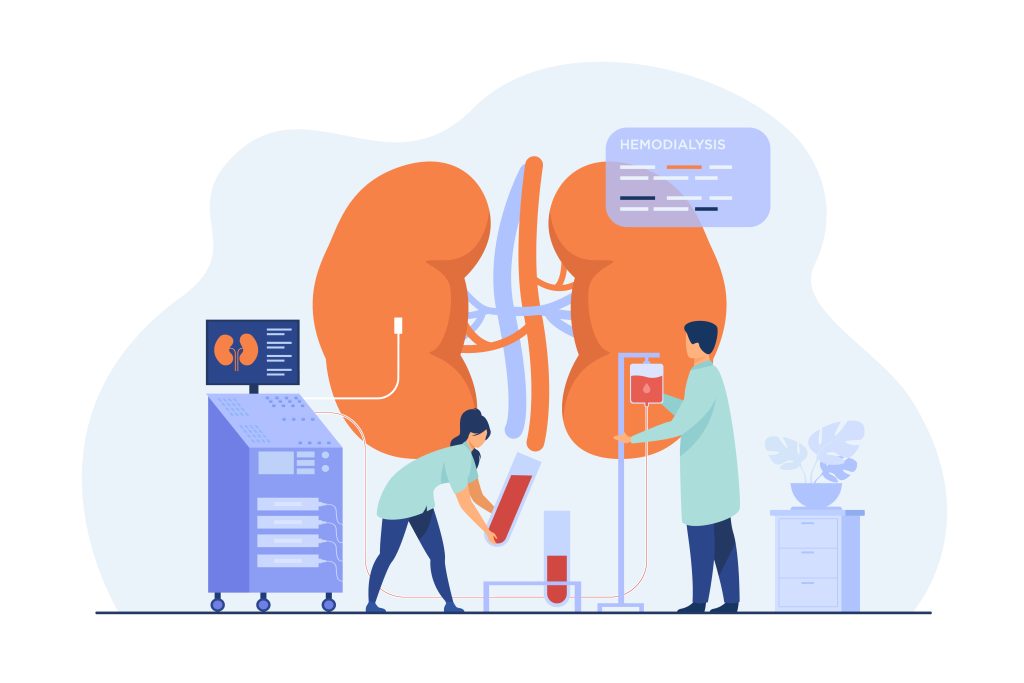Kidney stones are a painful condition that comes in several forms. Calcium oxalate kidney stones are the most common. However, there are also several other kinds. One less common type of calcium kidney stone that can be confused with calcium oxalate is calcium phosphate. These two share certain similarities but have different causes. Let’s look at the key differences between them and how you would go about preventing and treating each type.

Calcium Oxalate Stones
Calcium oxalate crystals or stones form when calcium binds with a compound called oxalate, which is found in many foods. This combination can cause blockages in the kidneys and urinary tract. One of the best ways to avoid or manage calcium oxalate is to reduce your intake of oxalates. These are found in foods such as beets, spinach, and other leafy vegetables, sweet potatoes, many soy products, beans, and other foods.
Calcium Phosphate Stones
The other, less common type of calcium stones are calcium phosphate. With these types of stones, calcium binds with phosphoric acid rather than oxalate. Calcium phosphate builds up in the urine, forming stones that can cause pain and, if they are large enough, block the flow of urine. These phosphate stones form when urine becomes too alkaline. They can come about due to urinary tract infections, thyroid disorders or from having too much acid in the kidneys.
Because calcium phosphate often builds up due to an underlying disease, it’s important to get an accurate medical diagnosis. For example, if you have a thyroid imbalance, you need to address that directly. At the same time, there are things you can do to treat and prevent calcium phosphate kidney stones.
Treatment Options For Calcium Phosphate
Before you can find the best treatment options, make sure you know for sure what kind of kidney stones you have. If they turn out to be calcium phosphate rather than oxalate, there may be different treatments and dietary recommendations involved. Treatment for calcium phosphate may include medication, recommendations to change your diet or, in the case of larger stones, medical procedures. Underlying conditions, such as urinary infections or hyperparathyroidism, must be addressed in addition to any kidney stones symptoms. Treatments for large kidney stones that don’t pass through the body on their own include sound wave treatment to break down stones and surgery to remove them.
Dietary Considerations For Calcium Phosphate
- Since calcium phosphate is associated with alkaline urine, you need to take steps to acidify the urine. Your doctor may prescribe certain medications for this purpose. You can also consume foods and beverages that have an acidifying effect. To help make your urine more acidic you should avoid most fruits (especially citrus fruits and juices), milk and other dairy products, and other foods which make the urine more alkaline. Eating more protein and foods such as cranberries (especially cranberry juice with vitamin C added), plums, or prunes may also help acidify your urine
A diet to treat and prevent calcium phosphate differs from a calcium oxalate stones diet, where you would want to avoid high oxalate foods. There are also many health food diets that discuss the benefits of being more alkaline. While this may be true in general, calcium phosphate indicates that your system is overly alkaline so you need to avoid anything that would increase this tendency.
Drink More Fluids
No matter what type of kidney stones you have, it’s important to drink plenty of water. You should drink at least six 8 ounce glasses of water spread throughout the day on a daily basis , and more if you’re very active. Don’t substitute caffeinated drinks, soda or alcohol, which can contribute to dehydration.
Find the Right Treatment For Kidney Stones
Although calcium oxalate is the most common variety of kidney stones, many people also suffer from other types. In addition to calcium phosphate, there are uric acid stones, cystine stones and struvite stones. The symptoms of these kidney stone types can overlap but the causes and treatments can differ. By listening to your health care provider and making any necessary lifestyle adjustments, you can manage kidney stones and prevent them from recurring.
